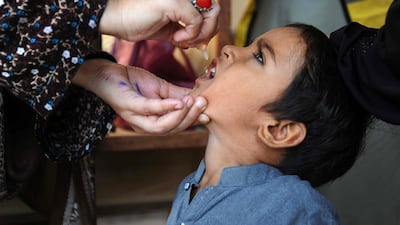Last month, a play made its debut in London’s Kiln Theatre that laid bare the emotive and complex reasons behind some people’s decision to not only refuse potentially life-saving vaccines for themselves but also for their children.
In Pins and Needles three characters – Mary, a mother trying to make critical decisions for her family, Robert, an angry son suspicious of institutions, and Dr Edward Jenner, the father of modern vaccinations – powerfully debate a series of scientific, political and healthcare issues. However, the essential question posed by the production is this: “Who do you trust?”
Pins and Needles is a fictional exploration of a troubling real-world problem. Research findings published by The Lancet medical journal in May revealed that over the past five decades, vaccinations have saved almost 154 million lives worldwide. Yet, millions of people around the world still refuse to get immunised against preventable illnesses or delay their decision so long that they put their health at risk.
The scale of the problem is so big that, in 2019, the World Health Organisation said vaccine hesitancy was among the top 10 threats to global public health. Additional WHO data has painted a worrying picture – last year, the percentage of children worldwide who received their first dose of the measles vaccine was down three per cent on 2019. In July, research from the WHO and Unicef revealed that although worldwide diphtheria, tetanus and pertussis immunisation coverage was 84 per cent last year, the same as in 2022, this was a two per cent decline from 2019.
The reasons behind vaccine hesitancy are many. A legacy of unethical research involving minority groups, poor public health messaging, misinformation or the consequences of social inequality, such as lower levels of education, can fuel phobias about and resistance to vaccination. These are among the challenges that medical and policy experts gathered in Dubai this week for a vaccination and infectious disease summit have wrestled with.
The Healthcare Future Summit not only witnessed participants warning against complacency but identified areas for improvement in the fight to protect as many people as possible from disease. For example, Peter Pitts, a former member of the US Senior Executive Service and ex-associate commissioner for the Food and Drug Administration, told The National that although international collaboration could improve health security at a local level, “we don’t have a centralised brain trust thinking about these things so far”.
It may seem disappointing that since Dr Edward Jenner performed his first vaccination against cowpox in 1796, humanity is still not uniformly convinced by the science behind immunisation. This should encourage governments to work more proactively to make clear the benefits of well-researched and thoroughly tested vaccines, as well as dispelling myths and misinformation. There is also a case to be made for recasting vaccine education from being a topic for the biology classroom to one that is a core part of civics lessons, highlighting the link between personal responsibility and public health.
A little more than a week before Pins and Needles made its debut in London, the UAE’s Ministry of Health and Prevention launched its annual seasonal influenza awareness campaign. The importance of people – particularly those vulnerable to infections like pregnant women, the elderly and those with chronic illnesses – getting a flu jab is being shared on social media as well as in national newspapers, TV and radio programmes. Community events are taking place in a number of public places, including shopping centres and schools to encourage immunisation. Such regular campaigning is the foundation for maintaining a society’s acceptance of vaccination. As we are seeing, it is entirely possible to slip back into fear and suspicion, undoing the work that has saved so many lives.


